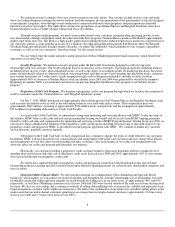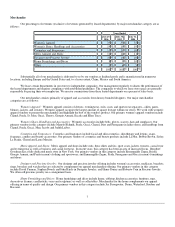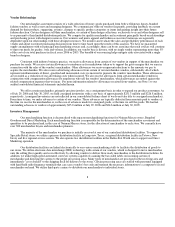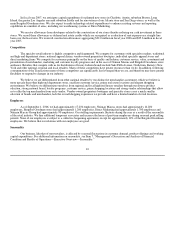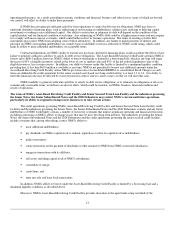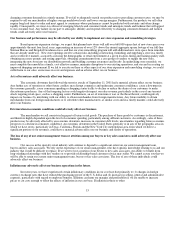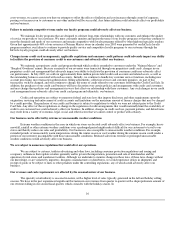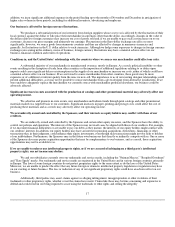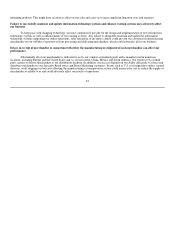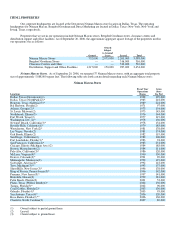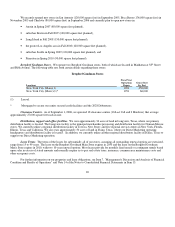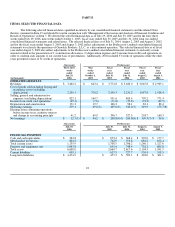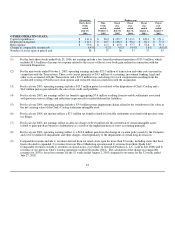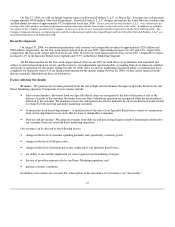Neiman Marcus 2005 Annual Report Download - page 19
Download and view the complete annual report
Please find page 19 of the 2005 Neiman Marcus annual report below. You can navigate through the pages in the report by either clicking on the pages listed below, or by using the keyword search tool below to find specific information within the annual report.
costs worsens, we cannot assure you that our attempts to offset the effects of inflation and cost increases through control of expenses,
passing cost increases on to customers or any other method will be successful. Any future inflation could adversely affect our profitability
and our business.
Failure to maintain competitive terms under our loyalty programs could adversely affect our business.
We maintain loyalty programs that are designed to cultivate long-term relationships with our customers and enhance the quality
of service we provide to our customers. We must constantly monitor and update the terms of our loyalty programs so that they continue to
meet the demands and needs of our customers and remain competitive with loyalty programs offered by other high-end specialty retailers.
Given that approximately 46% of our revenues at Neiman Marcus stores in calendar year 2005 were generated by our InCircle loyalty
program members, our failure to continue to provide quality service and competitive loyalty programs to our customers through the
InCircle loyalty program could adversely affect our business.
Changes in our credit card arrangements, applicable regulations and consumer credit patterns could adversely impact our ability
to facilitate the provision of consumer credit to our customers and adversely affect our business.
We maintain a proprietary credit card program through which credit is extended to customers under the "Neiman Marcus" and
"Bergdorf Goodman" names. Because a majority of our revenues were transacted through our proprietary credit cards, changes in our
proprietary credit card arrangement that adversely impact our ability to facilitate the provision of consumer credit may adversely affect
our performance. In July 2005, we sold our approximately three million private label credit card accounts and related assets, as well as
the outstanding balances associated with such accounts. Initially, we continue to handle key customer service functions, including new
account processing, most transaction authorization, billing adjustments, collection services and customer inquiries. As part of this
transaction, we have changed, and will continue to change, the terms of credit offered to our customers following the Credit Card Sale. In
addition, the purchaser of our credit card business will have discretion over certain policies and arrangements with credit card customers
and may change these policies and arrangements in ways that affect our relationship with these customers. Any such changes in our credit
card arrangements may adversely affect our credit card program and ultimately, our business.
Credit card operations are subject to numerous federal and state laws that impose disclosure and other requirements upon the
origination, servicing and enforcement of credit accounts and limitations on the maximum amount of finance charges that may be charged
by a credit provider. The purchaser of our credit card business is subject to regulations to which we were not subject prior to the Credit
Card Sale. Any effect of these regulations or change in the regulation of credit arrangements that would materially limit the availability of
credit to our customer base could adversely affect our business. In addition, changes in credit card use, payment patterns, and default rates
may result from a variety of economic, legal, social, and other factors that we cannot control or predict with certainty.
Our business can be affected by extreme or unseasonable weather conditions.
Extreme weather conditions in the areas in which our stores are located could adversely affect our business. For example, heavy
snowfall, rainfall or other extreme weather conditions over a prolonged period might make it difficult for our customers to travel to our
stores and thereby reduce our sales and profitability. Our business is also susceptible to unseasonable weather conditions. For example,
extended periods of unseasonably warm temperatures during the winter season or cool weather during the summer season could render a
portion of our inventory incompatible with those unseasonable conditions. Reduced sales from extreme or prolonged unseasonable
weather conditions would adversely affect our business.
We are subject to numerous regulations that could affect our operations.
We are subject to customs, truth-in-advertising and other laws, including consumer protection regulations and zoning and
occupancy ordinances that regulate retailers generally and/or govern the importation, promotion and sale of merchandise and the
operation of retail stores and warehouse facilities. Although we undertake to monitor changes in these laws, if these laws change without
our knowledge, or are violated by importers, designers, manufacturers or distributors, we could experience delays in shipments and
receipt of goods or be subject to fines or other penalties under the controlling regulations, any of which could adversely affect our
business.
Our revenues and cash requirements are affected by the seasonal nature of our business.
The specialty retail industry is seasonal in nature, with a higher level of sales typically generated in the fall and holiday selling
seasons. We have in the past experienced significant fluctuation in our revenues from quarter to quarter with a disproportionate amount of
our revenues falling in our second fiscal quarter, which coincides with the holiday season. In
16


